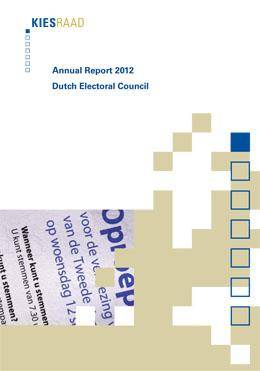Annual Report 2012 Dutch Electoral Council
The Electoral Council has published its 2012 annual report. The report contains an overview of the recommendations issued by the Electoral Council last year in the area of suffrage and elections. The annual report also details the Electoral Council's role as central electoral committee for the elections to the House of Representatives of 12 September 2012, the Elections Information Point and the Electoral Council's advice in lawsuits relating to the Electoral Act.

Especially in the run-up to the elections to the House of Representatives on 12 September 2012, the Electoral Council was frequently contacted with questions about the election process. The number of questions received by the Elections Information Point was 50% higher than at the 2010 elections to the House of Representatives. The Electoral Council's website and Election Results Database were also consulted frequently.
Elections
The following elections were held in 2012:
- elections to the House of Representatives (dissolution elections)
- redivision elections (for the new municipalities of Schagen, Molenwaard and Goeree-Overflakkee)
Recommendations
In 2012, the Electoral Council issued four recommendations, on the following topics:
- an amendment to the Water authorities Decree in connection with indirect water authority elections;
- temporary (Ballot Papers and Central Counting) Experiments Act;
- evaluation ecommendation on the 2012 Elections to the House of Representatives;
- models regulation.
Applications for registration
In 2012, the Electoral Council handled 33 applications for registration, one of which was not granted. Most applications for registration were connected with the early elections to the House of Representatives.
Voting computers
The preface to the annual report deals with Minister Plasterk's careful orientation on the reintroduction of voting computers. As can be read in the preface, the Electoral Council believes ‘that electronic voting would result in a more scrupulous election process’. It is argued that ‘it should be assessed whether the technological developments made since 2006 make it possible for our country to develop a new voting computer unencumbered by the objections from the past’. Earlier, the Electoral Council argued for the establishment of quality requirements that voting computers should meet.